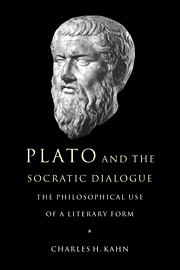Book contents
- Frontmatter
- Contents
- Preface
- List of abbreviations
- 1 Sōkratikoi logoi: the literary and intellectual background of Plato's work
- 2 The interpretation of Plato
- 3 Socrates
- 4 Plato as a minor Socratic: Ion and Hippias Minor
- 5 Gorgias: Plato's manifesto for philosophy
- 6 The priority of definition: from Laches to Meno
- 7 Charmides and the search for beneficial knowledge
- 8 Protagoras: virtue as knowledge
- 9 The object of love
- 10 The emergence of dialectic
- 11 The presentation of the Forms
- 12 Phaedrus and the limits of writing
- Appendix On Xenophon's use of Platonic texts
- Bibliography
- Indexes
5 - Gorgias: Plato's manifesto for philosophy
Published online by Cambridge University Press: 02 November 2009
- Frontmatter
- Contents
- Preface
- List of abbreviations
- 1 Sōkratikoi logoi: the literary and intellectual background of Plato's work
- 2 The interpretation of Plato
- 3 Socrates
- 4 Plato as a minor Socratic: Ion and Hippias Minor
- 5 Gorgias: Plato's manifesto for philosophy
- 6 The priority of definition: from Laches to Meno
- 7 Charmides and the search for beneficial knowledge
- 8 Protagoras: virtue as knowledge
- 9 The object of love
- 10 The emergence of dialectic
- 11 The presentation of the Forms
- 12 Phaedrus and the limits of writing
- Appendix On Xenophon's use of Platonic texts
- Bibliography
- Indexes
Summary
THE PLAGE OF THE GORGIAS
With the Gorgias we encounter one of Plato's greatest works, as it is also one of his longest. (Of all the dialogues, only the Republic and the Laws are longer.) Nowhere are the philosophic and dramatic components in Plato's art more powerfully blended than in the confrontation here between Socrates and his three successive interlocutors. Plato has taken up the old Greek moral theme of the choice between two lives and transformed it into a philosophical debate on the principles of morality and the nature of the good life. And by bringing both Socrates and his adversaries so vividly to life, Plato has represented these issues with unforgettable intensity.
The Gorgias is also a foundational text for two areas of philosophy; it is the first major work both in ethics and in political theory. Some of the same issues are discussed in the Crito, where Socrates gives his reasons for not escaping from prison. So Plato may be said to have founded moral philosophy twice: once in the Crito and a second time in the Gorgias. Plato was of course anticipated here by Socrates, to an extent that we cannot determine. And the power of the Gorgias largely derives from the fact that Socrates in this dialogue represents both the historical individual and also Plato's philosophical reflection upon the meaning of Socrates' life and death.
The Crito exemplifies moral philosophy by demonstrating how one can bring reason to bear on an important practical decision. Socrates is depicted as someone who is always ready “to obey the argument (logos) which, upon reflection, seems to me the best” (46B).
- Type
- Chapter
- Information
- Plato and the Socratic DialogueThe Philosophical Use of a Literary Form, pp. 125 - 147Publisher: Cambridge University PressPrint publication year: 1997



